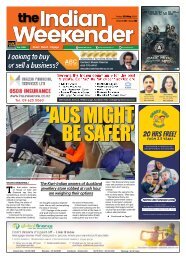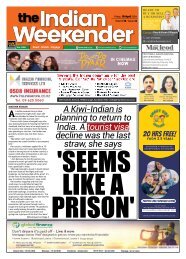The Indian Weekender, 30 April 2021
Weekly Kiwi-Indian publication printed and distributed free every Friday in Auckland, New Zealand
Weekly Kiwi-Indian publication printed and distributed free every Friday in Auckland, New Zealand
Create successful ePaper yourself
Turn your PDF publications into a flip-book with our unique Google optimized e-Paper software.
14 INDIA<br />
Friday, <strong>April</strong> <strong>30</strong>, <strong>2021</strong> <strong>The</strong> <strong>Indian</strong> <strong>Weekender</strong><br />
INDIA COVID: Hospitals<br />
overwhelmed as deaths pass 200,000<br />
India has reached the devastating figure<br />
of 200,000 coronavirus deaths, with the<br />
pressure on many hospitals showing no<br />
sign of abating amid a surging second wave.<br />
<strong>The</strong> real number of fatalities is thought<br />
to be far greater, with many not being<br />
officially recorded.<br />
Oxygen supplies remain critically low across<br />
the country, with the black market the only<br />
option for some people.<br />
Crematoriums are operating non-stop, with<br />
makeshift pyres in car parks.<br />
<strong>The</strong>re have been at least <strong>30</strong>0,000 new<br />
infections every day in the past week, with<br />
more than 360,000 new cases in the past 24<br />
hours. Overall, more than 17.9 million cases<br />
have been registered.<br />
Foreign aid has started to arrive from the<br />
UK and Singapore. Russia, New Zealand and<br />
France have pledged to send emergency medical<br />
equipment, and even regional rivals Pakistan<br />
and China have put aside their differences and<br />
promised to help.<br />
However, experts say the aid will only have<br />
a limited effect in a nation that has a population<br />
of 1.3 billion.<br />
A government website where <strong>Indian</strong>s can<br />
register for a vaccination programme crashed<br />
soon after it launched on Wednesday, as tens of<br />
thousands of people tried to access it.<br />
And in the state of Assam, a 6.4 magnitude<br />
earthquake damaged hospitals which were<br />
already under intense strain. People ran from<br />
their homes and other buildings in panic.<br />
Mortality data in India is poor and deaths<br />
at home often go unregistered, especially<br />
in rural areas.<br />
<strong>The</strong>re are reports of journalists counting<br />
bodies at morgues themselves, to try to get a<br />
more accurate number.<br />
In Uttar Pradesh, health officials said 68<br />
people had died on one day earlier this month<br />
across the state.<br />
But a Hindi newspaper pointed out that<br />
officials also said there were 98 Covid funerals<br />
in the capital, Lucknow, alone.<br />
One man in Uttar Pradesh was investigated for<br />
spreading a "rumour with an intent to cause fear<br />
or alarm" by asking for help to find oxygen for<br />
his sick grandfather on Twitter.<br />
It caused widespread anger, and the man<br />
could face jail.<br />
Crematoriums continue to work throughout<br />
the night to keep up with the number of bodies<br />
arriving, and many families are facing long<br />
waits before their loved ones can receive<br />
funeral rites.<br />
Some say they were asked to help speed up<br />
the process by piling the wood themselves.<br />
Perils of the black market<br />
In the southern city of Bengaluru, one doctor<br />
told the BBC people were panicking. It is<br />
one of the worst-hit cities in India, with some<br />
estimates saying there are about <strong>30</strong>0 active<br />
Covid cases per square kilometre.<br />
<strong>The</strong> BBC's Ashitha Nagesh spoke to the<br />
senior consultant at a government hospital, who<br />
asked to remain anonymous.<br />
"We were not prepared for this second<br />
surge," the consultant said. "For the first surge<br />
it was well organised - as soon as we came to<br />
know [of the virus] everything was streamlined<br />
and we were much better prepared.<br />
"This time there are more cases, it was more<br />
sudden, and the situation was not prepared for."<br />
With most hospitals overwhelmed, families are<br />
having to find ways to treat loved ones at home.<br />
Many have turned to the black<br />
market, where prices of drugs such<br />
With most hospitals at capacity, many people are seeking help elsewhere, including this woman outside a<br />
Sikh temple in Ghaziabad<br />
as remdesivir and tocilizumab, and oxygen<br />
cylinders, have soared.<br />
But even in this market, supply is<br />
no guarantee, reports the BBC's Vikas<br />
Pandey in Delhi.<br />
"I know a family that cobbled together<br />
money to buy the first three doses of remdesivir<br />
from the black market, but couldn't afford to<br />
get the remaining three as prices shot<br />
up further," our correspondent<br />
says. "<strong>The</strong> patient continues to<br />
be critical."<br />
Some private jet<br />
companies have reported a<br />
spike in business, as people<br />
try to fly their sick relatives to<br />
other hospitals in India.<br />
"It's basically families of<br />
"For<br />
the first surge it<br />
was well organised - as<br />
soon as we came to know<br />
[of the virus] everything was<br />
streamlined and we were much<br />
better prepared. This time there<br />
are more cases, it was more<br />
sudden, and the situation<br />
was not prepared for."<br />
patients who are looking to get into a hospital<br />
and are trying to see if there are any beds in<br />
other parts of the country," Ashish Wastrad,<br />
head of Air Charter Service's Mumbai<br />
office, says. However, he said the company's<br />
planes were not properly equipped to carry<br />
Covid-positive patients.<br />
<strong>The</strong> World Health Organization (WHO)<br />
reported in its weekly epidemiological<br />
update that there were nearly 5.7<br />
million new cases reported<br />
globally last week - and India<br />
accounts for 38% of them.<br />
It also said that the B.1.617<br />
variant of the virus detected<br />
in India has a higher growth<br />
rate than other variants<br />
in the country, suggesting<br />
increased transmissibility.<br />
India is carrying out the world's biggest<br />
vaccination drive, but less than 10% of the<br />
population has so far received an initial jab,<br />
and as infections continue to surge, there are<br />
concerns about meeting the demand.<br />
<strong>The</strong> US is helping India with the raw<br />
materials it needs for vaccine production,<br />
after India's biggest vaccine maker, the Serum<br />
Institute of India, complained of shortages of<br />
specialised imports from the US.<br />
Meanwhile, the first batch of the Russian<br />
vaccine, Sputnik V, is set to arrive in India on<br />
1 May, <strong>The</strong> New <strong>Indian</strong> Express reports. It has<br />
not yet been revealed how many doses will be<br />
delivered.<br />
A tragic sense of inevitability<br />
It's a horror story on repeat. Every day this<br />
week I've woken up to messages from friends<br />
and family in India, begging for help.<br />
Social media posts document the desperation.<br />
And it's not just in Delhi, it's in every corner of<br />
the country.<br />
"Can anyone find a bed in Jaipur for a<br />
friend's father?"<br />
"Who can help find some oxygen for a<br />
friend's grandmother in Uttar Pradesh?"<br />
"<strong>The</strong>re are no beds in Pune, what<br />
should we do?"<br />
And sometimes the messages are even<br />
bleaker. "My neighbour died yesterday," a<br />
friend told me. "We couldn't get him a bed."<br />
Watching from afar, images of a broken India<br />
are hard to process.<br />
Taxis have been turned into<br />
makeshift ambulances. Car parks have<br />
become crematoriums.<br />
Freedom has turned into fear.<br />
"I worry I might get the virus while I walk my<br />
dog," another friend tells me, as she struggles<br />
through Delhi's ongoing lockdown.<br />
Aid is starting to reach India from<br />
overseas. But not enough, as cases continue<br />
to swamp India.<br />
As the world looks on at the endless images<br />
of burning pyres, there's a tragic sense of<br />
inevitability.<br />
Government under fire<br />
India is heading towards state elections, and<br />
there is increasing anger towards both state<br />
authorities and the central government for<br />
the handling of the pandemic.<br />
Prime Minister Narendra Modi has been<br />
accused of ignoring scientific warnings to<br />
participate in election rallies and allowing<br />
a massive Hindu festival to go ahead in<br />
northern India.<br />
Dr Navjot Dahiya, the vice-president of the<br />
<strong>Indian</strong> Medical Association, called Mr Modi<br />
a "super spreader" who had "tossed all Covid<br />
norms in the air".<br />
<strong>The</strong> prime minister said he had held three<br />
meetings to discuss ways to increase oxygen<br />
capacities and medical infrastructure, including<br />
the use of trains and military aircraft to speed<br />
up transport of oxygen supplies.<br />
<strong>The</strong> BBC's Yogita Limaye says many people<br />
are asking why the military and disaster<br />
response teams have not been put on a war<br />
footing to build field hospitals.<br />
"<strong>The</strong>re is a sense of abandonment in the<br />
country, of people being left to fend for<br />
themselves," our correspondent reports.<br />
State and union territory governments, from<br />
Delhi to Karnataka, have been criticised for<br />
allowing Covid protocols to lapse and failing<br />
to prepare for what epidemiologists say was an<br />
inevitable surge in infections.


















